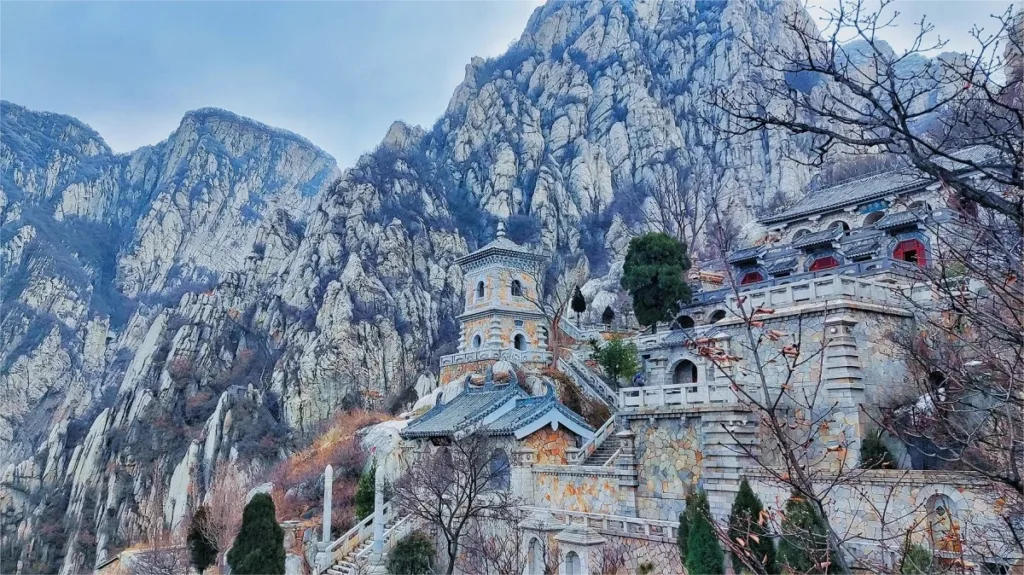The Shaolin Zen Music Ritual (禅宗少林音乐大典) takes place in a breathtaking canyon setting, with vertical mountains creating a stunning backdrop. The canyon is adorned with streams, trees, and stone bridges, providing the perfect natural elements for the performance. Spanning nearly three kilometers, with a peak elevation of 1400 meters, it boasts the world’s largest natural stage. Audience seating consists of winding wooden corridors and temple-like structures that blend harmoniously with the natural landscape. Comfortable mats are provided for spectators to sit on, adding to the theater’s unique ambiance.
Zen music, an integral part of Chinese Zen Buddhist culture, emerged as ancient musicians composed melodies based on the profound life insights gained by Zen masters. These melodies were inspired by the Mahayana Buddhist concept of “directly pointing to the mind and realizing enlightenment,” introduced to China by the revered Indian monk Bodhidharma. Rooted in the wisdom of ancient Zen teachings, Zen music embodies the essence of enlightenment and inner peace, enriching the spiritual experience of both performers and listeners alike.
Table of Contents
- Basic Information
- Location and Transportation
- Highlights of Shaolin Zen Music Ritual
- Vlog about Shaolin Zen Music Ritual
- Other Attractions in Shaoshi Mountain
Basic Information
| Length of Performance | 75 minutes |
| Ticket Price | 299 RMB |
| Opening Hours | 20.00 – 21.15 |
| Telephone Number | 0086-0371-62809111 0086-0371-62809222 |
Location and Transportation
The Shaolin Zen Music Ritual takes place in the Taixian Valley Scenic Area (待仙沟景区) in Dengfeng City, Zhengzhou, Henan Province, China. It is located approximately 7 kilometers away from the Shaolin Temple. Visitors can take bus route Dengfeng 1 to Ma Zhuang Reservoir and then walk westward for about 1.3 kilometers to reach the performance venue. Alternatively, you can take a taxi directly from Dengfeng city, with fares typically around 20 yuan.
Highlights of Shaolin Zen Music Ritual

The “Shaolin Zen Music Ritual” is a monumental production, with Tan Dun as the artistic director and composer, Mei Shuaiyuan as the producer, and guidance from prominent figures like Yi Zhongtian and Master Yungu. With Huang Doudou as the director, the performance showcases an unprecedented lineup and prowess. It unfolds in five chapters: “Water Music,” “Wood Music,” “Wind Music,” “Light Music,” and “Stone Music,” combining grand scale performances with visual artistry. The passionate performance of 88 ancient zithers, the portrayal of nearly 600 Zen martial artists, and the changing landscapes of the seasons all come together with the transcendental Buddhist music to create a magnificent symphony celebrating the glory of Mount Song.

“Water Music” paints a poetic landscape, depicting the serene beauty of classical Chinese landscape paintings. Divided into three chapters – “Traveling by the Stream,” “Listening to the Spring and Playing the Qin,” and “Walking on Water and Singing Songs” – it harmoniously depicts scenes of rain, streams, moonlight, temples, monks, and farmers, offering a tranquil vision of earthly life.
“Wood Music: Zen Meditation” portrays the ancient monastery with the sound of wooden fish, recounting the legends of Shaolin monks. As the shepherdess arrives, her song breaks the meditative tranquility of the wooden fish, introducing earthly beauty to this Buddhist paradise.

“Wind Music” narrates the legendary tales of Shaolin Temple, starting with Bodhidharma facing the wall, and continuing through a millennium of tradition. The portrayal of Shaolin martial arts within the natural landscapes of Mount Song, blending Zen and martial arts, depicts a magnificent scene of “pine winds in the myriad valleys.”
“Light Music” is the vibrant chapter of the performance, directly confronting the essence of life through enlightenment. Amidst snowy forests and Buddhist pagodas, ancient monks appear in a dreamlike setting, sharing Zen stories and guiding the audience to transcend life and death. The juxtaposition of auspicious Buddha lamps and scenes of mundane life expresses Zen’s reverence for all living beings.

“Stone Music” serves as a chant of praise, with instruments crafted from the ancient stones of Mount Song over 3.6 billion years. The stone instruments resound with the grandeur of “Mount Song Zen Meditation,” and as the stone music pays homage to the Buddha, a surreal scene of celestial flowers falling accompanies the climax of the music ritual. As the performance concludes, the colossal Buddha of Mount Song manifests in the clouds, casting its radiant light upon a serene and harmonious world.





